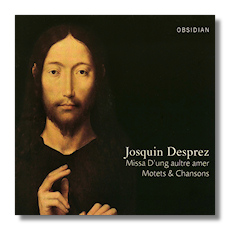
The Internet's Premier Classical Music Source
Related Links
-
Josquin Reviews
Ockeghem Reviews - Latest Reviews
- More Reviews
-
By Composer
-
Collections
DVD & Blu-ray
Books
Concert Reviews
Articles/Interviews
Software
Audio
Search Amazon
Recommended Links
Site News
 CD Review
CD Review
Josquin des Prés

- Mass "Missa D'ung aultre amer"
- Chanson "De tous beins plaine"
- Chanson "Mille regretz"
- Motet "Ave Maria"
- Chanson "Fortuna d'un gran tempo"
- Motet "Planxit autem David"
- Chanson "Cela sans plus"
- Chanson "Qui belles amours"
- Sanctus D'ung aultre amer
- Motet "Tu lumen, tu splendor patris"
- Chanson "La Bernardina"
- Victimae paschali laudes/D'ung aultre amer
- Chanson "Adieu mes amours"
- Chanson "Ile fantazies de Joskin"
- Tu solus qui facis mirabilia/D'ung aultre amer
- Johannes Ockeghem: Chanson "D'ung aultre amer"
Andrew Lawrence-King, Renaissance harp
Alamire/David Skinner
Obsidian CD701
This is the third release on the new British label specializing in music from major composers who lived between 1300 and 1750, Obsidian. Their "Tomkins - These Distracted Times" was favorably reviewed last month (Obsidian CD702). This release features motets, chansons and the mass, "D'ung aultre amer" by Josquin des Prés (c.1440-1521); it's well up to the same standard.
The same forces – Alamire (up to nine voices), Andrew Lawrence-King (Renaissance harp) and director David Skinner who is also head of music at Sidney Sussex College, Cambridge – are once again in their element. Their music-making is directed, enthusiastic, very immediate and down to earth. Yet also full of fresh insights into the way the music works. Interestingly, Josquin was known to have been a perfectionist who brooked no 'improvements' to his work. Alamire must work with this in mind; yet their performances are still vibrant and do seem to have the sense of spontaneity necessary to emphasize the music's color and originality. In his illuminating liner notes Skinner quotes John Milsom: "A singer of Josquin's day was more than a maker of beautiful sound. He was an orator, a projector of words, sense and meaning." This is clearly what Alamire has aspired to in this collection – and succeeded.
It's an appealing selection of work, too. The emphasis is on Josquin's earlier music and adds the Renaissance harp to the chansons. This works well, though may sound a little 'forward' to ears more used to hearing them unaccompanied.
The "Missa D'ung aultre amer" is one of the composer's earliest masses, and certainly one of his shortest: tracks 2-6 last barely 13 minutes here. It's based on a three-voice rondeau quatrain by Josquin's teacher, Johannes Ockeghem (c.1410-1479). It uses that melody in the tenor part, Josquin's own D'ung aultre amer in the superius. The gift that Alamire have is of combining the purity, directness and simplicity of this nevertheless compelling mass with its more profound – almost inevitable – qualities as music of real sensitivity and tenderness. They achieve this by self-confidence, restraint and unself-conscious introspection. Other tracks on this CD contain compositions either published in early collections with the Mass and/or likely to have been sung with it… D'ung aultre amer [tr.20], Tu lumen, tu splendor patris [tr.15], Victimae paschali laudes [tr.17] as well as the Sanctus D'ung aultre amer [tr.14].
Stylistic considerations are what place several of the other items on this recording early in Josquin's career; although Planxit autem David [tr.12] is known to be later. Each has something special; happily, one of Josquin's most celebrated melodies, Mille regretz [tr.8] is here too. Alamire have approached each of these pieces as individual works of beauty and delight in their own right, and not as 'examples' or as parts of a series. The fact that they are all so different is not lost on performer or listener. Yet the singers (and Lawrence-King where he is involved, [tr.s7,10,12,16,19]) are determined to make each note, each phrase, each line count; and at the same time to convey something of the greatness of a composer straddling the Medieval and Renaissance periods, styles and sensibilities.
This is a well-chosen, well-recorded and well-presented CD, then. The text in Latin/French and English is there – albeit hard to read (like the rest of the booklet) because of the choice of colors (fawn on chocolate). For lovers of atmospherically sung (and played) music, which is also projected with a blend of immediacy and dignity and also provides an insight into one of Western music's most original innovators this is a CD to buy without hesitation.
Copyright © 2008 by Mark Sealey





















